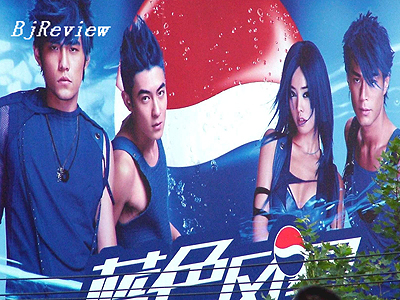
In 2005 Pepsi began launching a massive marketing campaign to promote its soft drink with the theme "Blue Storm." Contrary to Pepsi's expectations, the campaign resulted in a lawsuit. Lanye, a small Zhejiang-based beer producer, had registered the trademark of "Blue Storm" in 2003 and used it on soft drinks, mineral water, beer and other beverages they produced.
Lanye filed a lawsuit to the Hangzhou Intermediate People's Court on December 12, 2005, claiming Pepsi had infringed on its trademark by introducing the "Blue Storm" series products, and asked Pepsi for a public statement to clarify Lanye as the original user of the trademark.
On May 30 this year, the Higher People's Court of Zhejiang Province overturned the ruling of the lower court and decided in favor of the small brewery's claim of 3 million yuan as compensation from Pepsi over the trademark infringement.
Yet, Pepsi hadn't paid the compensation as of the June 12 deadline. Huang Zhibin, Pepsi's legal representative, declined to comment, saying the company hadn't authorized a response.
Wu Baojian, Lanye's legal representative, said they would continue to use legal means, pushing Pepsi to pay compensation. He also said that Pepsi was one of 14 companies involved in the marketing of "Blue Storm," and Lanye still retains the right to sue the other 13 companies even though they had already ceased to use "Blue Storm" in advertisements.
More than one company in China has suffered from trademark infringements by multinational companies. Some small companies overseas often register famous Chinese trademarks in their countries before the related Chinese companies can take action. Some multinationals in developed countries have taken advantage of these trademarks to launch unfair competition against Chinese companies. According to the most recent statistics of the State Administration for Industry and Commerce, 15 percent of the well-known trademarks in China have been maliciously registered by counterparts overseas. For example, Wuliangye (alcohol) was registered in South Korea; Konka (TV sets), in the United States; Hisense (electrical appliance), in Germany; and Kelon (electrical appliance), in Singapore. There are over 100 cases of malicious trademark registration of Chinese trademarks overseas every year involving cosmetics, beverages, home appliances, clothing and cultural industries.
"Chinese enterprises should improve their awareness of trademark protection," warned Wu, saying Lanye's case would remind Chinese enterprises of the importance of trademark protection and management despite the fact that legal circles might have different opinions on the verdict.
Wu also pointed out that more and more private companies today are daring to sue multinationals and are winning the cases. This provides strong evidence for an awakening sense of intellectual property rights (IPR) protection for Chinese companies and for the improvement of the overall IPR protection status in China.
Trademark infringement
For the nationwide "Blue Storm" marketing campaign, Pepsi signed on many singers, sports figures and movie stars. This brought a lot of trouble to Lanye.
"The more effort they put into promoting their soft drink, the more people would believe we were producing fakes," said Liang Yonghua, Manager of Lanye. "People thought we were trying to pass off a name brand as our own."
Liang's words rang true. In November 2005, the local quality and technical supervision bureau thought Lanye's beer was fake and confiscated 107 cases before Lanye issued the certificate of trademark registration and got the beer back.
Because of this some enterprises terminated their contracts with Lanye, refusing to associate with a company accused of producing fake products. "We can't afford to produce fake beverages," said Liang. An investigation showed Pepsi used the logo of "Blue Storm" in many advertisements and in packaging and design that covered a majority of the Chinese market.
Liang said beer production is the first step in their "Blue Storm" series. They were brewing a plan to develop other beverage and tea drinks of the same brand while Pepsi's campaign was sweeping the country. As a result, the intended contractor terminated the negotiation and left with a question: "Aren't you dragging me into producing fake Pepsi?"
| 